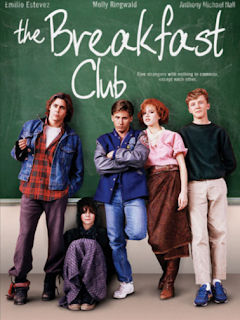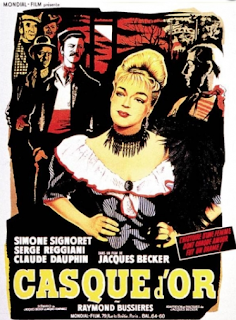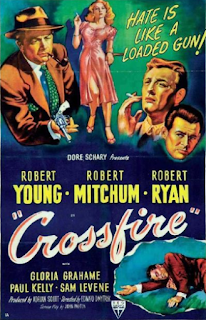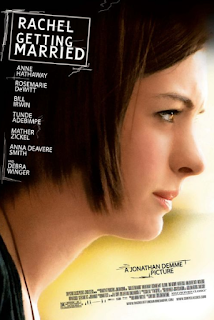The Breakfast Club (1985)

When it came out in 1985, The Breakfast Club was a financial and critical success. Since then, it has grown to become a cult movie and one of the most acclaimed high school movies of all time. It's cultural significance is impossible to deny - it represents a whole generation and it was a trailblazer for all high school movies to come. But its reputation is not only earned on its historical importance - it's a genuinely great film, a sharp, intelligent social commentary that puts it on a completely different level than the majority of coming-of-age movies.
The film was written and directed by John Hughes, one of the most important artists within the genre of coming-of-age movies. With this movie and Sixteen Candles, released the year prior to The Breakfast Club, he invented a new language and a new way to portray teenagers on-screen and his influence can be seen in many contemporary films. His craft was revolutionary because he was one of the first directors and screenwriters to uncompromisingly side with the young generation - with no judgement and no moralism. His characters are not filtered through an adult's point-of-view but instead he shares their angst, passion and spirit of rebellion and gives voice to their protest against the establishment. Until his work, teenagers in movies were often looked down at in a way that was either dismissive or condescending and even in their most positive portrayals what was shown was an idealized version of them, a representation of a common conception insead of a full-fleshed, realistic one. Hughes' movies are not especially remarkable for their technical craft, but their understanding of youth was exceptionally innovative.
The Breakfast Club focuses on five students who are forced to spend the Saturday in detention: Claire (Molly Ringwald) is a popular and pampered beauty queen, whose first scene depicts her voicing her concern about her father's inability to get her out of detention; Bender (Judd Nelson) is a rebellious delinquent for whom spending the Saturday in detention has become a habit; Brian (Anthony Michael Hall) is a student as intelligent as he is geeky and goofy; Andrew (Emilio Estevez) is the school's wrestling champion and Allison (Ally Sheedy) is a friendless, introverted oddball. Their punishment consists in writing an essay about who they are, under the supervision of the principal assistant Richard Vernon (Paul Gleason in an intentionally villanous, venomous performance). The five of them barely know each other - or, to put it better, they know each other but carefully avoid spending time together: in the school's strictly, ridiculously hierarchic system, they belong to different, non communicating cliques. But over the course of the day, they are forced to rely on each other and realize they might not be as different as they think.
Hughes' feriociously sharp, biting screenplay is the movie's strongest weapon. First off, he carefully avoids giving their characters heavily stylized, precocious dialogues that are so common in teenage movies: they talk, sound and behave like real students. And he characterizes the five main roles with the same care and respect: there is not one who is portrayed in a more positive light than the other: everyone is beautiful and flawed in equal measure, which is fitting to the movie's theme of mutual understanding and support among teens against a society that does not understand them. Gleason's character is clearly the movie's villain and he's an effective embodiement of the efficient, strict, apathetic establishment that does not have the patience nor the empathy to stop and lend an ear but instead prefers to judge beforehand. But the greatness of the screenplay does not derive exclusively for its intelligent commentary, but also its ability to blend the heavier themes within the general pattern of a comedy. The Breakfast Club is not just a social analysis but also a comedy, and in that regard it's engaging, electrifying and exceptionally fun (the pot scene has rightfully become iconic throughout the years). And Hughes is a pro at handling the tonal shifts of the movie, without letting the more serious aspects of the story compromise the more light-hearted ones and viceversa.
Of course, a key element for the movie's success is its ensemble: in a movie that is all about deconstructing clichés, they are all excellent at embodying initially the stereotypes their characters seem to embody and then gradually revealing their tormented, complex, layered being. Molly Ringwald impressively portrays her character's apparently obnoxious behavior while powerfully revealing Claire's anxiety and strain due to being constantly forced to apply to the standards someone else imposed on her: as the movie progresses and Claire starts to bond with the group, Ringwald charmingly conveys Claire's growth into a more relaxed, open person. Judd Nielsen's performance might go a tad overboard at times, but for the most part it's showboating at its best: he's a live wire, bringing both the chaotic aggresiveness and appealing charisma the character requires while affectingly conveying his own personal plight. Emilio Estevez's turn might seem a little dull at first glance but it's fitting to the character of Andrew, a guy who seems so eager to please his father that he has almost forgotten his own identity, and when the character reveals the reason behind his detention he delivers a hard-hitting portrayal of guilt. Anthony Michael Hall is endearingly awkward in the role before turning into an unexpectedly heartbreaking figure. But best of all is Ally Sheedy in a riveting performance of dazzling unpredictability and genuine feeling: her character is initially relegated to the background, but once she steps up she is a true scene-stealer. All those actors are great separately but they are even better as a group: they create an infectuously fun dynamic between their characters and when they finally set aside their differences and start defying the rules they give the story an inspiring power.
The Breakfast Club is not a movie without its flaws. The scene in which Bender sticks his head between Claire's legs is one of the rare moments in which the laugh sticks in your throat: it's one of the few aspects in which the movie is dated and it certainly leaves a sour aftertaste. Moreover, the ending is not entirely convincing with certain developments between the character's relationships being a little rushed. But overall The Breakfast Club is a remarkable comedy and an even more noteworthy study of adolescence and teenagers' struggle to being understood. And it's in this message that the movie finds its everlasting power.
90/100



This is a classic no doubt, a movie that I've seen at least three times myself. Of all the famous Teen movies of the 1980's this one probably appealed to me the most. A lot of it is dated for sure: In fact, Molly Ringwald recently wrote an essay detailing how the movie looks now through the eyes of the recent political climate. Its written not so much from a position of damnation, but more or less a reflection on what was seen as acceptable in film at the time - the table scene specifically. Its no different from us looking at Breakfast at Tiffany's and asking why Mickey Rooney's performance was tolerated. That's just in the recent lense, though, because all in all "The Breakfast Club" has stood the test of time and will always have a special place in my heart.
RispondiEliminaJust out of curiosity, Giuseppe, have you seen all the male nominees from 2017 and will you still do a ranking of both categories?
I read Ringwald's articole and I thought it was beautifully written and incredibly interesting. I agree with her completely: there is no denying that the movie is dated in certain regards (that scene in particular is just plain bad) but it's also impossible to deny the cultural significance of the movie and its positive elements.
EliminaI've seen all except for Washington and Plummer. I'm not sure if I'll rank the categories, certainly not anytime soon and if I will I think I'll just do a brief ranking in a single post. If you want, you can ask me my ratings and thoughts on them (I'd say it is also likely I will review Call Me By Your Name quite soon here).
In that case, then, what are your thoughts and ratings for Dafoe, Harrelson, Jenkins, Rockwell, Chalamet, Day-Lewis, Kaluuya and Oldman?
EliminaDafoe - 4.5 (I have to go out on a limb and say that Bria Vinaite was the MVP for me. Anyway Dafoe gives an excellent performance here and makes the most out of what could have been a very one-dimensional character. He is terrific at portraying his character’s good-hearted nature and his genuine concern towards the leading characters but also his strain that comes from their constantly off-putting behavior. He is the conscience and heart of the movie and his reactionary work towards the end is rather heartbreaking)
EliminaHarrelson - 4 (One of my favorite elements of the film in spite of his limited screen-time. He’s great at portraying his empathy and understanding towards Mildred’s plight but also his frustration that comes from being the object of her anger. The cough scene is by far the highlight of the film as the two actors turn it into an unexpectedly moving moment. He’s also quite moving in his final scenes, even in spite of Cornish’ absymal performance)
Jenkins - 5 (The role is technically a stereotype but he breathes so much life into it. First off, his chemistry with Hawkins is marvelous and the two of them make their friendship meaningful, honest and moving. Jenkins is endearing and funny in the role, especially in his interactions with the creature, and in the few moments devoted to him he’s heartbreaking at portraying his loneliness and melancholy over his personal life and career. It’s a lovely performance)
Rockwell - 3.5 (Well first off I think I should address the controversy regarding the character. I have no problem about his character starting a path of redemption, but the problem is a) how the movie glosses over the topic of police violence on black people, a topic which is presented and then not explored b) how rushed the development is. Anyway I found Rockwell’s performance to be actually pretty terrible in the first half of the movie as I thought it was more of a broad cartoon than anything else. He improves later on and he’s genuinely great in his scenes of guilt and self-reflection. As I said his arc is rushed and partly problematic, but he handles it very well. It’s not a great performance for me, though I must stress that I did not dislike it and he was excellent past a certain point)
I’ll post my thoughts on the other four later :)
I agree thought wise on the first three, though I'd go for a 4.5 for all of them. As for Rockwell, I actually think Louis gives a perfect summation of the performance, controversy and all. Ergo, he'd get a 5 from me and probably be my win.
EliminaI kind of agree with Giuseppe on these, except for Jenkins, who is good but not great imo (to me, he's more memorable in Step Brothers :D). Great review by the way, can't wait for the next one!
Elimina@Mitchell: I can see the appeal regarding Rockwell's performance, but I found it overall a bit of a mixed bag. I definitely won't deny that he has his moments of excellence but I have some problems with it, especially in the first half in which I thought he was excessively broad.
EliminaChalamet, Call Me By Your Name - 5 (My favorite performance of 2017 and I found to be absolutely marvelous. From his two 2017 outputs, I have to say I'm quite fond of him as an actor as he seems to be a naturally gifted and spontaneous performer. Regarding his portrayal of Elio, I found it extremely admirable that he was not afraid of turning him into an occasionally obnoxious character: he brings the needed arrogance and apparent confidence to the role while still making the viewer invested into his personal journey and also showing an underlying insecurity in his behavior. Chalamet is terrific at portraying his character's discovery of his sexuality with remarkable naturalism, carefully conveying step by step his growing attraction towards Oliver. It helps that he shares a phenomenal chemistry with Armie Hammer and the two of them make the blossoming relationship between Elio and Oliver extremely captivating and emotionally resonant. In the last act, I found Chalamet to be utterly devastating in his portrayal of Elio's emotional state and his final scene is particularly astonishing as he silently conveys so well his heartbreak but also the remaining joy that comes from the memories of their relationship)
Day-Lewis - 5 (Reynolds is a character that is extremely hard to pull off as it can easily come off as insufferable. Day-Lewis is fantastic at portraying Reynolds' obnoxious personality, in a way that is both intentionally frustrating and incredibly fun, while also bringing an incredible amount of charisma and screen-presence to him. Moreover, he excels at showing Reynolds' passion and devotion towards his craft, an aspect that a lesser actor could have easily missed. Past that, he shares an impeccable chemistry with both of his co-stars. His scenes with Manville, for the reasons I mentioned in my review of her performance on the other blog, are incredibly fascinating and his scenes with the amazing Krieps are even more so. The two actors make the relationship between Reynolds and Alma so compelling and intriguing from start to finish, nailing all of its nuances and complexities. It's a great performance and an essential part to the success of this masterpiece)
EliminaKaluuya - 5 (Loved his performance. His character is more difficult than it might seem at first glance: he is a somewhat passive character for most of the time, the sane man among deranged people. But Kaluuya gives a magnificent performance, impressively portraying his character's growing confusion and then terror while also being an incredibly likeable and endearing lead. And he absolutely nails every emotional beat: he's heartbreaking in his portrayal of his character's trauma, with his acting in the "sink into the floor" scene being especially harrowing, and in the later scenes he's truly hard-hitting at portraying his character's devastation over the betrayal. It's largely thank to his brilliant performance that the movie doesn't go off the rail once the horror starts, because he always keep the emotional journey of the character at the core of the film)
Oldman, Darkest Hour - 4 (I'll start off saying that I didn't care much for the movie which I thought was a rather unremarkable piece with some particularly low moments, such as the subway scene. I'd say Ben Mendelsohn gave the best performance in the movie, but I liked Oldman's as well. In terms of impersonation, I thought he disappeared into the role quite well, imitating effectively Churchill's real tone of voice and general manner. His work though isn't a mere impersonation as he brings the needed fire and incisiveness in his speeches while portraying effectively his personal doubts and insecurities in his private moments. It's not a performance I loved due to the film's shortcomings that, in my opinion, he was unable to overcome, but it's a strong turn)
@Alex: Thank you very much!
I guess I just wasn't feeling the love this year for best actor, but I won't deny every nominee gives a strong turn in their own way. Chalamet and Kaluuya are both remarkably assured and show a lot of promise for their future careers. Then there's Day-Lewis who gives one of his most personal efforts to date, which I wholeheartedly stand by as the rightful winner. Oldman is in a weak movie, no doubt, but I thought he did about as much with the part that was possible - plus, he doesn't get to be the lead too often which makes his performance especially inspired. Even Washington, who is in a movie I found to be completely confused and underwhelming, gives a very good effort in a very atypical part for his range. Its a terrific field and I could see someone justifying everyone who was chosen.
EliminaOh, and if you ever do see "All the Money in the World" by all means let us know what you think. I've already praised Michelle Williams in my own review of her, but Plummer gives superb work of his own that stands well above the unorthodox nature of his casting.
I love this film quite a lot. It's not flawless, but there's a reason why it's stood the test of time as well as it has.
RispondiEliminaAlso, as always, great review :)
Thank you very much!
EliminaI haven't seen this movie yet, but i really need to check this out after reading your review!
RispondiEliminaBy the way i'm glad you will continue to write about movies, i missed your blog in those months but i understand why you put that on stand by.
I know you would have loved Chalamet in Call Me By Your Name, what did you think of the rest of the cast? I'm very curious to read your thoughts on Amira Casar, i really liked her.
You should see it! It's an interesting movie and even if you don't love it it's undoubtly quite fun to watch.
EliminaI'm glad you understand about my decision.
Hammer - 5 (He's my Best Supporting Actor winner, and easily. He shows perfectly the careless nonchalance in his behavior that Elio finds so frustrating initially while also carrying a great deal of charm in his performance, making Elio's attraction towards him entirely believable. As I mentioned above, his chemistry with Chalamet is incredible and they portray the relationship so well together but on his own I felt Hammer was terrific at subtly conveying a vulnerability and sensitivity unknown to Elio in the early scenes. He portrays a genuine love in his interaction with Elio, but also a far greater awareness of the problems that their relationship might cause. I found to be especially touching in his later scenes as he portrays so well the character's realization that his time with Elio is coming to an end and I found his reactionary shot on the train to be particularly harrowing)
Stuhlbarg - 5 (He doesn't get to do a lot before the very end, but I felt Stuhlbarg made the most out of the character. He brings a genuine sweetness and openness to the character and makes for a very endearing presence whenever he is on-screen. Then of course he is magnificent in his final monologue with his loving, tender delivery making it all the more powerful. Moreover, over the course of the movie it is implied that the character might be gay himself and though Stuhlbarg never clarifies that he interestingly plays with the idea making both interpretations of the character entirely possible)
Cesar - 4 (Very effective performance as she has a certain ethearal quality to it that fits perfectly the movie's setting as this is sort of heavenly, open-minded enviroinment. Cesar brings the needed warmth to the character while subtly conveying her character's awareness of the true nature of the relationship between Oliver and her son. The scene in which she silently conforts him in the car is especially moving and Cesar conveys a ton of feelings without saying anything)
Garrel - 3.5 (I thought she was quite good in her brief screen-time at portraying her frustration over Elio's growing detatchment from her and then she is quite moving in her final scene at portraying her character's maturity as she offers to be Elio's friend in spite of his ungenerous treatment of her)
Great movie, but I think I might actually prefer Pretty in Pink. It’s just such a great examination of social inequality through the lens of high school and it lacks the sexist and racist issues with Sixteen Candles and, to a lesser extent, Breakfast Club.
RispondiEliminaI was immensely disappointed by Sixteen Candles, though. Sure, it’s hilarious at times and has some truly inspired character development at points, but it’s only scattered throughout and is mostly drowned out by racism (Watanabe does his best, but Long Dong Duk is just bad) and a blasé attitude toward rape that is, at best, dated.
I have yet to see both Pretty in Pink and Sixteen Candles! I’m interested in watching them and see if we’ll agree.
Elimina